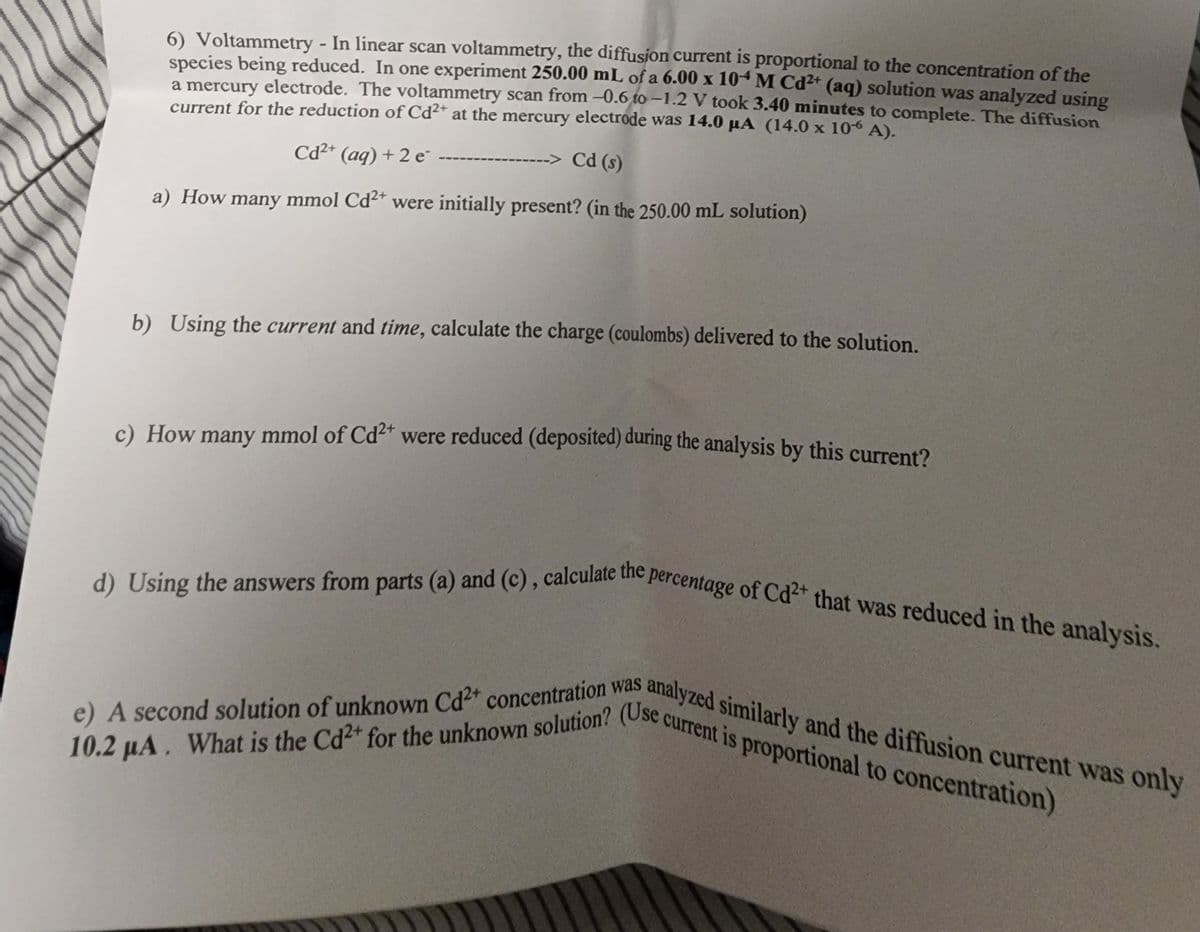6) Voltammetry - In linear scan voltammetry, the diffusion current is proportional to the concentration of the species being reduced. In one experiment 250.00 mL of a 6.00 x 104 M Cd²+ (aq) solution was analyzed using a mercury electrode. The voltammetry scan from -0.6 to-1.2 V took 3.40 minutes to complete. The diffusion current for the reduction of Cd²+ at the mercury electrode was 14.0 µA (14.0 x 10° A). Cd²+ (aq) + 2 e ----> Cd (s) a) How many mmol Cd²+ were initially present? (in the 250.00 mL solution) b) Using the current and time, calculate the charge (coulombs) delivered to the solution. c) How many mmol of Cd²+ were reduced (deposited) during the analysis by this current? d) Using the answers from parts (a) and (c), calculate the percentage of Cd2+ that was reduced in the analysis. e) A second solution of unknown Cd²+ concentration was analyzed similarly and the diffusion current was only 10.2 µA. What is the Cd2+ for the unknown solution? (Use current is proportional to concentration)
6) Voltammetry - In linear scan voltammetry, the diffusion current is proportional to the concentration of the species being reduced. In one experiment 250.00 mL of a 6.00 x 104 M Cd²+ (aq) solution was analyzed using a mercury electrode. The voltammetry scan from -0.6 to-1.2 V took 3.40 minutes to complete. The diffusion current for the reduction of Cd²+ at the mercury electrode was 14.0 µA (14.0 x 10° A). Cd²+ (aq) + 2 e ----> Cd (s) a) How many mmol Cd²+ were initially present? (in the 250.00 mL solution) b) Using the current and time, calculate the charge (coulombs) delivered to the solution. c) How many mmol of Cd²+ were reduced (deposited) during the analysis by this current? d) Using the answers from parts (a) and (c), calculate the percentage of Cd2+ that was reduced in the analysis. e) A second solution of unknown Cd²+ concentration was analyzed similarly and the diffusion current was only 10.2 µA. What is the Cd2+ for the unknown solution? (Use current is proportional to concentration)
Principles of Instrumental Analysis
7th Edition
ISBN:9781305577213
Author:Douglas A. Skoog, F. James Holler, Stanley R. Crouch
Publisher:Douglas A. Skoog, F. James Holler, Stanley R. Crouch
Chapter25: Voltammetry
Section: Chapter Questions
Problem 25.1QAP
Related questions
Question

Transcribed Image Text:6) Voltammetry - In linear scan voltammetry, the diffusion current is proportional to the concentration of the
species being reduced. In one experiment 250.00 mL of a 6.00 x 104 M Cd2+ (aq) solution was analyzed using
a mercury electrode. The voltammetry scan from -0.6 to -1.2 V took 3.40 minutes to complete. The diffusion
current for the reduction of Cd2+ at the mercury electrode was 14.0 μA (14.0 x 106 A).
Cd²+ (aq) + 2 e ---
-> Cd (s)
a) How many mmol Cd2+ were initially present? (in the 250.00 mL solution)
b) Using the current and time, calculate the charge (coulombs) delivered to the solution.
c) How many mmol of Cd²+ were reduced (deposited) during the analysis by this current?
d) Using the answers from parts (a) and (c), calculate the
percentage of Cd²+ that was reduced in the analysis.
e) A second solution of unknown Cd2+ concentration was analyzed similarly and the diffusion current was only
10.2 µA. What is the Cd2+ for the unknown solution? (Use current is proportional to concentration)
Expert Solution
This question has been solved!
Explore an expertly crafted, step-by-step solution for a thorough understanding of key concepts.
This is a popular solution!
Trending now
This is a popular solution!
Step by step
Solved in 2 steps

Knowledge Booster
Learn more about
Need a deep-dive on the concept behind this application? Look no further. Learn more about this topic, chemistry and related others by exploring similar questions and additional content below.Recommended textbooks for you

Principles of Instrumental Analysis
Chemistry
ISBN:
9781305577213
Author:
Douglas A. Skoog, F. James Holler, Stanley R. Crouch
Publisher:
Cengage Learning



Principles of Instrumental Analysis
Chemistry
ISBN:
9781305577213
Author:
Douglas A. Skoog, F. James Holler, Stanley R. Crouch
Publisher:
Cengage Learning

